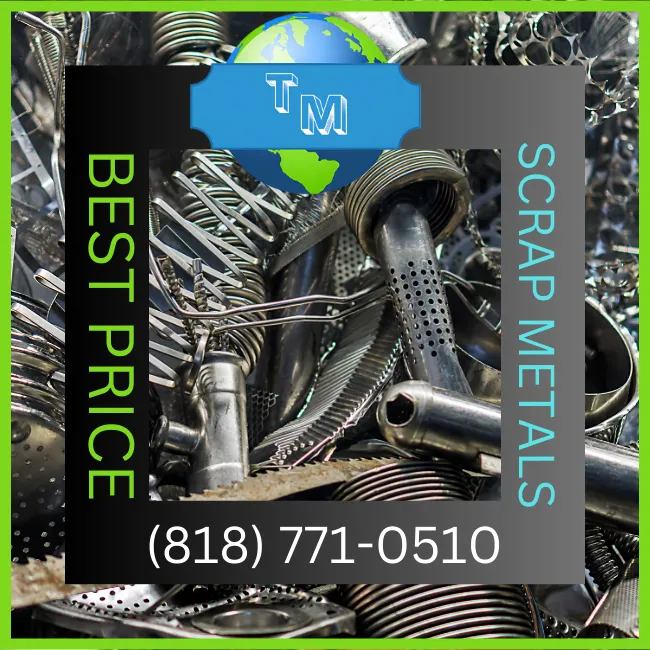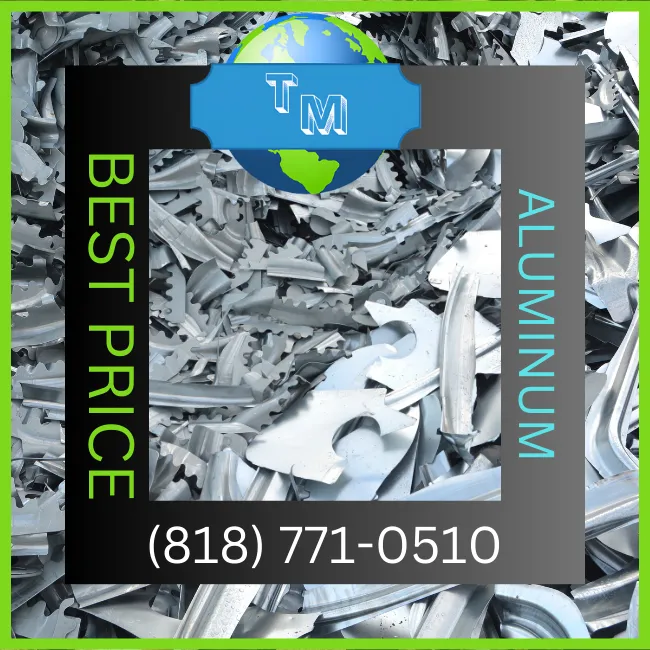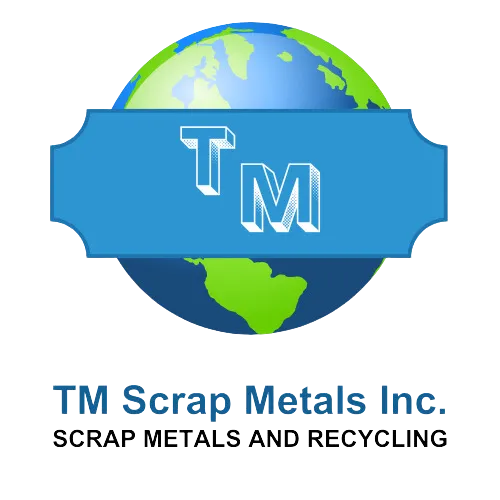Sponsored





Aluminum Recycling in Sun Valley
Reliable Local Centers For Fast, Eco-friendly Aluminum Recycling
Looking to recycle aluminum in Sun Valley? Connect with trusted local recycling centers that offer competitive rates, efficient service, and environmentally responsible solutions. Whether it's cans, siding, or industrial scrap, these Sun Valley professionals make aluminum recycling simple and rewarding. Browse nearby facilities and get started today!
Aluminum Recycling in Sun Valley: Why Hire a Professional Aluminum Recycling Service
The Value of Expert Aluminum Disposal and Environmental Responsibility
Understanding Aluminum Recycling in Sun Valley
Aluminum recycling in Sun Valley plays a vital role in promoting sustainability and reducing waste. As one of the most recyclable materials, aluminum offers significant environmental and economic advantages when properly processed. Despite its recyclability, managing aluminum waste requires specialized knowledge and equipment, making professional recycling services a smart choice.
From beverage cans to siding and automotive parts, aluminum products are everywhere. In a growing area like Sun Valley, the demand for responsible waste management increases daily. Professional services ensure that aluminum is efficiently collected, sorted, and repurposed, minimizing landfill contributions and conserving energy.
Why Hire a Professional Aluminum Recycling Service
Professional aluminum recycling services offer safety, efficiency, and environmental stewardship. Handling large quantities of aluminum—especially from construction or industrial projects—can be risky and labor-intensive. Professionals are equipped to manage these tasks safely and in compliance with health and environmental regulations.
Moreover, experienced recyclers stay updated with fluctuating aluminum market prices, ensuring clients receive fair compensation. These experts also help businesses and residents navigate recycling policies specific to Sun Valley, streamlining the process from start to finish.
The environmental benefits are substantial. Recycling aluminum saves up to 95% of the energy needed to produce new aluminum from raw ore. A professional service maximizes recovery rates and reduces greenhouse gas emissions, contributing to a cleaner, greener Sun Valley.
Selecting the Right Aluminum Recycling Partner in Sun Valley
Choosing the right aluminum recycling service in Sun Valley involves evaluating experience, certifications, and community reputation. Look for companies with a proven track record in aluminum waste handling and a commitment to eco-friendly practices.
Local expertise is another major advantage. A Sun Valley-based service provider will be familiar with regional guidelines, offer quicker response times, and often support local environmental initiatives. This strengthens the overall impact of your recycling efforts.
Transparency and customer service matter, too. A reputable aluminum recycling company will offer detailed assessments, transparent pricing, and reports on the quantities and outcomes of recycled materials, giving you confidence in your environmental contributions.
TM Scrap Metals, Inc
Recycling Center

Google: 4.8 stars
Ferrous Metals Recycling, Non-Ferrous Metals Recycling
(818) 771-0510
11092 Tuxford St, Sun Valley, CA 91352
Website: www.tmscrapmetals.com




Crown Recycling Services
Google: 4.0 stars
Services: Construction & demolition recycling, wood and yard waste recycling
📞 (818) 768-4214
📍 9189 De Garmo Ave, Sun Valley, CA 91352
🌐 Website not listed
Ecology Auto Parts, Inc.
Google: 4.2 stars
Services: Auto parts recycling, metal recycling, tire recycling
📞 (818) 767-8336
📍 14036 Balboa Blvd, Sun Valley, CA 91352
SA Recycling
Google: 4.2 stars
Services: Scrap metal recycling, ferrous and non-ferrous metal recycling, electronic waste recycling, metal processing
📞 (818) 504-4140
📍 8250 Tujunga Ave, Sun Valley, CA 91352
Kramar Metals
Google: 4.5 stars
Services: Scrap metal recycling, industrial scrap metal recycling, metal processing, buying and selling of various metals
📞 (818) 767-4303
📍 8821 San Fernando Rd, Sun Valley, CA 91352
Aluminum Recycling in Sun Valley
Fast, eco-friendly aluminum recycling with top payouts.
Recycle aluminum for cash today at our Sun Valley center!
People Also Ask
Recyclable aluminum is commonly found in beverage cans, food containers, foil, siding, window frames, and car parts. Industrial sources include manufacturing scrap from processes involving sheets, extrusions, and castings. Many everyday products, such as electronics and appliances, also contain aluminum components. Collecting these items for recycling helps reduce the demand for raw materials and lowers environmental impact. Aluminum is highly recyclable and retains its quality indefinitely, making it a valuable resource in the circular economy.
Aluminum recycling conserves up to 95% of the energy required to produce aluminum from bauxite ore. This significant energy savings translates into lower greenhouse gas emissions and reduced water and air pollution. Recycling also minimizes the need for mining, which helps preserve natural landscapes and reduces habitat disruption. As aluminum can be recycled repeatedly without degrading its quality, it plays a crucial role in sustainable resource management and reducing environmental footprint.
The aluminum recycling process begins with collection and sorting to remove impurities and separate aluminum from other materials. The metal is then shredded, cleaned, and melted in a furnace. The molten aluminum is poured into molds or cast into ingots for reuse in manufacturing. This process is significantly more energy-efficient than producing new aluminum from raw ore and supports the creation of new products such as cans, construction materials, and automotive parts with reduced environmental impact.
Yes, coated or painted aluminum can typically be recycled. During the recycling process, high-temperature furnaces burn off paints, coatings, or other surface treatments without affecting the underlying metal. However, separating aluminum from excessive contamination improves efficiency and reduces processing costs. Some recycling centers may have specific guidelines for accepting coated materials, so it’s best to consult your local facility for recommendations on preparation and acceptance standards.
Items that combine aluminum with other non-recyclable materials, such as some multi-layer packaging or electronics, may not be suitable for standard aluminum recycling. Aluminum foil that is heavily soiled with food waste, containers with plastic linings, and certain treated alloys can also pose issues. Always check with your recycling provider to understand what is accepted. Proper sorting ensures the purity of recycled aluminum and maintains the efficiency of the recycling process.
Yes, aluminum recycling often offers a financial return due to the high market value of aluminum scrap. Beverage cans and industrial scrap are especially sought after and can be sold by weight to recycling centers. The actual value varies based on market conditions and the cleanliness and type of aluminum. For businesses and individuals, consistently recycling aluminum not only supports sustainability but also provides a way to offset costs or generate revenue.
Sun Valley, CA: The Heart of Scrap Metal Recycling
The History and Evolution of Sun Valley
Sun Valley has a rich history that dates back to the early 20th century. Originally an agricultural area, it evolved into a hub for industrial activities as Los Angeles expanded. The post-World War II boom brought a surge of manufacturing and industrial businesses to Sun Valley, laying the groundwork for the community’s future as a center for scrap metal recycling.
Today, Sun Valley is a bustling urban area with a mix of residential, commercial, and industrial zones. Its industrial areas are home to numerous scrap metal recycling facilities, making it a go-to destination for businesses and individuals looking to recycle their metal waste.
The Importance of Scrap Metal Recycling in Sun Valley
Scrap metal recycling is not just a business in Sun Valley—it’s an essential part of the local economy and the broader effort to promote environmental sustainability. The recycling of scrap metal reduces the need for mining new metals, conserves natural resources, and lowers greenhouse gas emissions. Given the global demand for metals, recycling also helps stabilize prices and supply.
In Sun Valley, the scrap metal industry provides jobs, supports local businesses, and plays a crucial role in waste management. The area’s recycling facilities process thousands of tons of metal each year, turning what would otherwise be waste into valuable resources. This industry’s success in Sun Valley has also fostered a community that understands and values the importance of recycling.
Types of Scrap Metals Commonly Recycled in Sun Valley
- Aluminum: Widely used in packaging, transportation, and construction, aluminum is one of the most recycled metals in Sun Valley. It’s lightweight, corrosion-resistant, and can be recycled indefinitely without losing its properties.
- Copper: Known for its excellent conductivity, copper is highly sought after in the scrap metal industry. It’s commonly found in electrical wiring, plumbing, and electronics.
- Steel: A primary material in construction and manufacturing, steel is the most recycled material in the world. Sun Valley’s facilities process vast amounts of steel, from old vehicles to construction debris.
- Brass: This alloy of copper and zinc is commonly found in plumbing fixtures, radiators, and musical instruments. Brass is valued for its durability and resistance to corrosion.
- Lead: Often used in batteries and radiation shielding, lead is a toxic metal that must be recycled responsibly. Sun Valley’s recycling centers ensure that lead is handled and processed safely.
- Stainless Steel: This corrosion-resistant metal is used in a variety of applications, from kitchen appliances to medical instruments. It’s another common material processed in Sun Valley’s recycling facilities.
The Process of Scrap Metal Recycling in Sun Valley
The process of recycling scrap metal in Sun Valley is both efficient and environmentally friendly. It typically involves several key steps:
- Collection: Scrap metal is collected from various sources, including households, businesses, and construction sites. Many recycling centers in Sun Valley offer pick-up services, making it easy for residents and businesses to recycle their metal waste.
- Sorting: Once the metal arrives at the recycling facility, it is sorted into different categories based on type and quality. This step is crucial for ensuring that the metal is processed correctly and efficiently.
- Processing: After sorting, the metal is processed to remove any non-metallic materials, such as plastic, rubber, or wood. This often involves shredding the metal into smaller pieces to make it easier to handle.
- Melting: The shredded metal is then melted down in large furnaces. The melting process is carefully controlled to ensure that the metal is pure and free of contaminants.
- Purification: In some cases, the melted metal is purified to remove any remaining impurities. This step is especially important for metals that will be used in sensitive applications, such as electronics or medical equipment.
- Solidification: Once purified, the molten metal is poured into molds to create ingots, sheets, or other forms that can be used in manufacturing. These recycled metals are then sold to manufacturers, who use them to create new products.
Environmental Impact of Scrap Metal Recycling
Recycling scrap metal in Sun Valley has a significant positive impact on the environment. By recycling metals, the need for mining raw materials is reduced, which in turn decreases the destruction of natural habitats, lowers energy consumption, and minimizes pollution. The recycling process itself uses less energy compared to producing new metals from ore, resulting in a smaller carbon footprint.
Additionally, recycling scrap metals helps reduce the amount of waste sent to landfills. Metals take a long time to decompose, and by recycling them, Sun Valley helps reduce the environmental strain of waste management.
Economic Benefits of Scrap Metal Recycling
The scrap metal recycling industry in Sun Valley is not just environmentally beneficial—it also brings substantial economic advantages. The industry creates jobs at various levels, from collection and processing to sales and management. This contributes to the local economy by providing employment opportunities and stimulating business growth.
Moreover, recycling metals allows businesses to save on raw material costs. Recycled metals are often cheaper than newly mined ones, which helps manufacturers reduce production costs. This cost-saving advantage can be passed on to consumers, making products more affordable.
Challenges Faced by the Scrap Metal Industry
Despite its benefits, the scrap metal industry in Sun Valley faces several challenges. One of the main issues is the fluctuation in metal prices, which can affect the profitability of recycling operations. Additionally, the industry must deal with the improper disposal of non-recyclable materials, which can contaminate the recycling process and increase operational costs.
Another challenge is the need for continuous investment in technology and infrastructure. As environmental regulations become stricter, recycling facilities must upgrade their equipment and processes to meet these standards. This requires significant financial investment, which can be a burden for smaller businesses.
The Future of Scrap Metal Recycling in Sun Valley
Looking ahead, the future of scrap metal recycling in Sun Valley appears promising. As awareness of environmental issues continues to grow, so does the demand for sustainable practices like recycling. Technological advancements are also expected to play a key role in improving the efficiency and effectiveness of recycling processes.
In addition, the increasing global demand for metals, driven by industries such as construction, automotive, and electronics, will likely boost the scrap metal industry. Sun Valley, with its established recycling infrastructure, is well-positioned to meet this demand and continue its legacy as a leader in scrap metal recycling.
Conclusion
Sun Valley, CA, has established itself as a vital center for scrap metal recycling, contributing significantly to environmental sustainability and the local economy. Despite the challenges it faces, the industry’s future looks bright, with ongoing advancements in technology and an increasing emphasis on recycling. For residents and businesses alike, Sun Valley remains a beacon of responsible waste management and resource conservation.
References: Wikipedia


